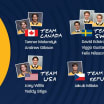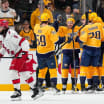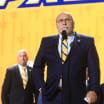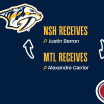One year ago, everyday life as we knew it came to a screeching halt.
Schools, offices, stores and restaurants - just about everything and everyone - were affected in some way as the COVID-19 pandemic began to take hold in the United States.
The sporting world was shut down too - the Predators flew home from Toronto unsure of what was next, and back home in Nashville, after one single day of the SEC Men's Basketball Tournament at Bridgestone Arena, the entire event was canceled within hours, the hardwood left empty.
One year later, things are looking up.
SEC Men's Basketball Tournament Returns to Bridgestone Arena
SEC Commissioner Says Predators, Bridgestone Arena Relationship Key in Hosting Tournament During Pandemic
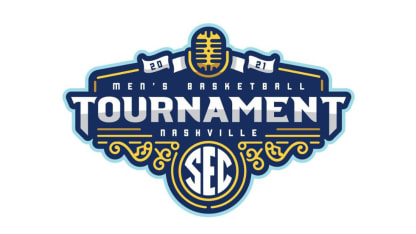
© SEC
Life isn't completely back to normal, of course, but we're getting there - and the court is back at Bridgestone Arena, and so is the SEC Tournament.
"It's great to be back in Nashville," SEC Commissioner Greg Sankey said. "It's been a long journey. I really attribute it to our teams that we've played as many games as we have in this environment, and to finish back in Music City with the tradition we've created will be something special."
The 2021 version of the tournament gets underway Wednesday at 501 Broadway and continues through the weekend with the championship game set for Sunday afternoon.
Other than Predators hockey games, the tournament marks the first major sporting event hosted at the arena since the pandemic began, a major milestone in beginning to welcome events back to the city as conditions improve.
Of course, the goal was always for the SEC to be back in Nashville in 2021, the spot where the tournament will be held through 2030, with the exception of 2022 when the SEC Women's Tournament will be in Nashville. Thanks to extensive planning and a dedication to see things through from all parties involved, basketball will be played at Bridgestone once more.
"We've been fortunate to build great relationships with the Predators from a leadership level and through the entire organization," Sankey said. "That's been a meaningful part of making it possible for us to return - the willingness to communicate about local health issues, how do we create an access structure for some level of fans, and there's been a lot of learning from what the Predators have been able to do. I was able to attend a game just a few weeks ago, and while it's just different than what we're accustomed to - you don't have the raucous atmosphere, but you still can allow folks in - and [we learned a lot from seeing what the Preds were doing]."
"It's all been really relationship based and the ability to communicate, have enough trust that we've got great partners in Nashville who can work through these issues, and they know they can trust us to think about how to support our teams, to do it the right sort of way and work effectively with everything that's in place locally."
That relationship between the Preds and the SEC began almost a decade ago, and Sankey credits Predators President and CEO Sean Henry as helping to drive the discussions of bringing the tournament back to Nashville year after year.
"We can really build something special [in Nashville], and I would say we'll answer that question [of how do we bring more buzz to the tournament] that was asked because of what happens outside [the arena]," Sankey said. "Seeing what Predators fans experienced during the run to the Stanley Cup Final, the outdoor atmosphere makes us think of how we can create that atmosphere during our tournament week? There's obviously Broadway, and just the feel of the Music City that makes it really special, and all of that is what brought us to Nashville. To answer that question of, 'How do we create an atmosphere around our tournament?' We think there's no better place for that to happen than Nashville, Tennessee."
After months of planning, the weekend will fly by, just as it always does, but after a year away, all of the work that went into making sure the tournament could happen will be well worth it.
Pandemic or not, putting together a tournament of this magnitude presents unique challenges no matter the situation. Sankey and the SEC knew they could make it happen, however, especially in the spot where they've decided to call home for the foreseeable future - and he can't wait to see someone cut down the net.
"Our young people want the opportunity to compete," Sankey said. "There's been a lot of criticism about, 'Why are they trying? Why are they working so hard? Why are they conducting competition and dealing with disruption?' Yet, in every encounter I've had, and I expect I'll have it there, the young people on our teams who we call student athletes have said, 'Thanks for giving us a chance to play.' And it's a recognition that time marches on, and this is their time to have an opportunity. It's not like you just put everything on hold, and we'd come back whenever all of this is over, whenever that may be, and everything's the same and we just go on. No, we needed to provide an opportunity, and so I'm most looking forward to that and taking a sense of pride in providing that opportunity and naming a champion."

